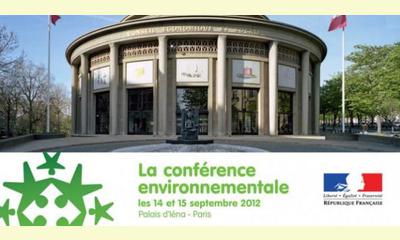|
|
French Environmental Associations Prepare for Confrontation
un article par P.B., La France Agricole
In the days before environmental conference to be held on 14 and 15 September 2012 in Paris, the associations of environmental protection (Rally for the Planet, France Nature Environnement (FNE), League for the Protection of Birds (LPO ), Nicolas Hulot Foundation, Humanity and Biodiversity) indicated that they are waiting for the new government's ecological transition.

click on photo to enlarge
"We will not solve the economic crisis without addressing the ecological crisis, it is urgent," said Bruno Gentile, president of FNE, looking forward to the conference discussions.
Agriculture is at the heart of the discussions at round tables on biodiversity, energy and health which also involve the farming unions and the Minister of Agriculture.
On energy, NGOs want the government to take a clear position to penalize polluting energies and nuclear power, and accelerate the use of renewable energy (wind, solar, biomass, ocean, geothermal, and hydropower). In the view of Rally for the Planet, agricultural biogas projects "should remain consistent with the major environmental, agronomic and social objectives" and they denounced in that regard, the project for 1000 cows in the Somme.
Concerning biodiversity, Allain Bougrain Dubourg, president of the LPO (League for the Protection of Birds), indicates they want to "achieve the objective of no artificial land by 2020" and ensure that associations pay "special attention to the preservation of wetlands which are the nursery of life."
Reiterating their positions on a "real greening of the PAC (Common Agricultural Policy)", the NGOs urgethe Government to take the necessary steps to reduce the use of pesticides by 50%, the commitment of the Grenelle Agreement by the Sarkozy government. In this regard they defend the need for a significant increase in the tax on diffused pollution according to the pesticide reduction plan Ecophyto drafted in 2009.
Other commitments have been made "without the necessary means to implement them," laments Faraco Benoit, spokesman for the Fondation Nicolas Hulot. The commitment of 6% organic surface in 2012, for example, is ultimately only 3%. "We must reach 20% of surface bio quickly," insisted the association president.
For NGOs, the ecological transition also involves a profound change in agricultural practices and the nature of decision-making. "We need to clarify the language between the Ministries of Agriculture and the Environment," says the president of the LPO.
Finally, to overcome the lack of means dedicated to ensure the "ecological transition" NGOs advocate the creation of a "bank of ecological transition that supports innovative projects in the field of environment."
The NGOs engaged in discussions of the next days are waiting for François Hollande to confirm his promises by concreteactions and an agenda for all the government ministries.
(Click here for a French version of this article)
|








|
DISCUSSION
Question(s) liée(s) à cet article:
Despite the vested interests of companies and governments, Can we make progress toward sustainable development?
* * * * *
Commentaire le plus récent:
[responding to CPNN article The film 'Demain', a manifesto?
Yes initiatives from the grassroots are important and necessary which will have a direct impact on the present and the future. But there are governments like India which are conscious of over exploitation of the earth’s resources and are taking suitable policy measures and also taking legal action against the exploiters.
We must emphasize public transportation and reduce our dependence on individual cars even though the auto industry will not like this.
Otherwise it is not demain but aujourdhui — the problems are there for us to see.

|
|









